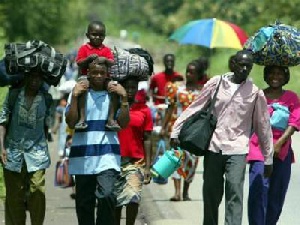The United Nations High Commissioner on Refugees (UNHCR) on Thursday said about 9,800 Ivorian refugees are currently living in Ghana.
The UNHCR said of the number, 8,000 are living in three emergency camps in the Western, Brong- Ahafo and Central Regions, which are not conducive for them, with the rest living as urban refugees.
Ms Patience Folley, UNHCR Ghana Assistant Public Information Officer made the disclosure during a media encounter with some United Nations Agencies in Accra.
She said the Ivorian refugees need about 1,200 semi-permanent housing units; however the UNHCR had been able to put up 364 of them.
She said the UNHCR is ensuring that refugees in Ghana are self-reliant by helping them to stand on their feet, adding that “we are providing them with skills training”.
Ms Folley gave the assurance that through the help of other UN Agencies and donor organisations, the UNHCR would be able to provide enough food for refugees living in camps in Ghana in 2014.
She said UNHCR is facing challenges in dealing with urban refugees, since they are not at a particular point for them to be conveniently attended to. She noted that the major problem facing refugees in Ghana is work permit.
Ms Folley described the Liberian refugees’ situation in Ghana as a protracted case; since they had lived in the country for more than 20 years and peace had return to their home country.
She said Liberian refugees’ cessation was invoked in June 2012, however, about 5,000 0f them are currently living in Ghana under the suspended effect.
She said a team of experts from the Liberian Ministry of Foreign Affairs this week ended their work of vetting and issuing them with their nationality passport at the Liberian refugees’ camp in Ghana
Ms Folley said the Liberian refugees’ camp could be closed down by the end of December, declaring that the refugees are being assisted with some grants to enable them integrate into the country.
She said two-year residence permit had been given to them.
In March 2011, refugees fleeing the fighting in the Ivorian post electoral violence crossed over to Ghana; after the war, majority of them had since returned home under the auspices of the UNHCR.
General News of Friday, 20 December 2013
Source: GNA

















